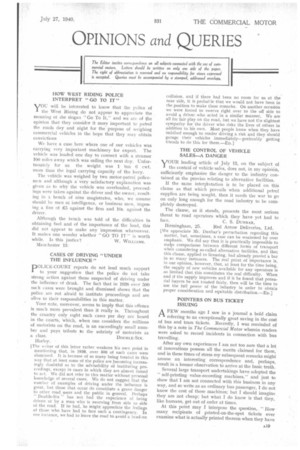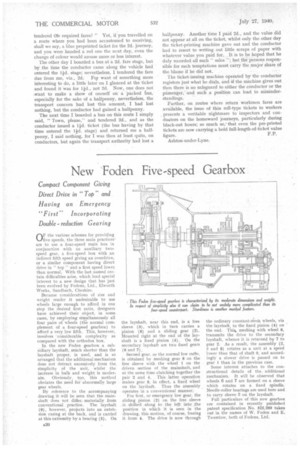OPINIONS and QUERIES
Page 21

Page 22

If you've noticed an error in this article please click here to report it so we can fix it.
The Editor incites cormpondence on all subjects connected with the use of commercial motors. Letters should be written on only one side of the paper. The right of abbreviation is reserved and no responsibility for views expressed is accepted. Queries must be accompanied by a stamped, addressed envelope.
HOW WEST RIDING POLICE INTERPRET "GO TO IT"
YOLwill be interested to know that the police of the West Riding do not appear to appreciate the meaning ox the slogan "Go To It," and we are of the opinion that they consider it more important to patrol the roads day and night for the purpose of weighing commercial vehicles in the hope that they may obtain convictions We have a case here where one of our vehicles was carrying very important machinery for export. The vehicle was loaded one day to connect with a steamer 100 miles away which was sailing the next day. Unfortunately for us the weight was 1ton 6 cwt. more than the legal carrying capacity of the lorry.
The vehicle was weighed by two motor-patrol policemen and although a very satisfactory explanation was given as to why the vehicle was overloaded, proceedings were taken against the driver and the owner, resulting in a bench of nine magistrates, who, we assume should be men ot intelligence, or business men, imposing a fine of £5 against the firth and 10s. against the driver.
Although the bench was told of the difficulties in obtaining fuel and of the importance of the load, this did not appear to make any impression whatsoever. It makes one wonder whether "GO TO IT" is worth while. Is this justice? W. WILLIAMS. Manchester 13.
CASES OF DRIVING "UNDER THE INFLUENCE"
POLICE-COURT reports do not lend much support to your suggestion that the police do not take strong action against those suspected of driving under the influence of drink. The fact that in 1938 over 500 such cases were brought and dismissed shows that the police are not afraid to institute proceedings and are alive to their responsibilities in this matter.
Your note, moreover, seems to imply that this offence is much more prevalent. than it really is. Throughout the country only eight such cases per day are heard in the courts, 'which, when one considers the millions of motorists on the road, is an exceedingly small number and pays tribute to the sobriety of motorists as
a class. DOUBLE-SIX. Honey. •
f.The writer of this letter rather weakens his own point in mentioning that, in 1938, over 500 of such cases were dismissed. It is because of so many being treated in this way that at least some of the police are becoming increasingly doubtful as to the advisability Of instituting proceedings, except in cases in which they are almost forced to act. We did not refer to this matter without personal knowledge of several cases. We do not suggest that the number of examples of driving under the influence is great, but those that occur do constitute a grave danger to other road.users and the public in general. Perhaps " Double-Six " has not had the experience of being driven at by a man who is swerving from side to side of the road. If he had, he might appreciate the feelings of those who have had to face such a contingency. In one instance, we had to leave the road to avoid a head-on collision, and if there had been no room for us at the near side, it is probaHe that we would not have been in the position to make these remarks. On another occasion we were forced to swerve right over to the off side to avoid a driver -who acted in a similar manner. We are all for fair play on the road, but we have not the slightest sympathy for the driver who risks the lives of others in addition to his own. Most people know when they have imbibed enough to render driving a risk and they should garage their vehicles immediately—preferably getting friends to do this for them.—En.]
THE CONTROL OF VEHICLE SALES—A DANGER
YOUR leading article of July 13, on the subject of the control of vehicle sales, does not, in my opinion, sufficiently emphasize the danger to the industry contained in the proviso relating to alternative facilities.
If the same interOretation is to be placed on this clause as that which prevails when additional petrol supplies are being sought, then it needs the war to go on only long enough for the road industry to be completely destroyed.
The clause, as it stands, presents the most serious threat to road operators which they have yet had to face. C. S. DuNsAa, Birmingham, 25. Red Arrow Deliveries, Ltd.
OW appreciate Mr. Dunbar's perturbation regarding this matter, but, sometimes, a case can be weakened by over emphasis. We did say that it is practically impossible to make comparisons between different forms of transport when considering so-called alternative facilities, and that this clause, applied to licensing, had already proved a bar in so many instances. The real point of importance is, in our opinion, however, that, at least for the time being, the supply of new vehicles available for any operators is so limited that this constitutes the real difficulty. When and if the supply improves and if it be found that potential buyers be not treated fairly, then will be the time to use the full power of the industry in order to obtain proper consideration and equitable distribution.—En.] POINTERS ON BUS TICKET ISSUING
AFEW months ago I saw in a journal a bold claim referring to an exceptionally great saving in the cost of bus and tram tickets. Recently, I was reminded of this by a note in The Commercial Motor wherein readers were asked to record incidents in connection with bus travelling.
After my own experiences I am not too sure that a lot of innovations possess all the merits claimed for them, and in these times of stress my subsequent remarks might arouse an interesting correspondence and, perhaps, result in a keener observation to arrive at the basic truth.
Several large transport undertakings have adopted the " self-printingvalue-recording machines," and just to show that I am not connected with this business in any way, and so write as an ordinary bus passenger, I do not know the cost of these machines; but I should imagine they are not cheap; but what I do know is that they, like humans, get out of order at times.
At this point may I interpose the question,. " How many recipients of printed-on-the-spot tickets ever examine what is actually printed thereon when they have tendered th'e required fares? " Yet, if you travelled on a route where you had been accustomed to receiving, shall we say, a blue preprinted ticket fox the 2d. journey, and you were handed a red one the next day, even the change of colour would arouse more or less interest.
The other day I boarded a bus at a 2d. fare stage, but by the time the conductor came along the vehicle had entered the lid. stage; nevertheless, I tendered the fare due from me, viz., 2d. Fqir want of something more interesting to do, a little later on I glanced at the ticket and found it was for lid., not 2d. Now, one does not -want to make a show of oneself on a packed bus, especially for the sake of a halfpenny, nevertheless, the transport concern had lost this amount, I had lost nothing, but the conductor had gained a halfpenny.
The next time I boarded a bus on this route I simply said, "Town, please," and tendered 2d., and as the conductor issued a lid. ticket (the bus having by that time entered the lid. stage) and returned me a halfpenny, I said nothing, for I was then at least quits, on conductors, but again the transport authority had lost a halfpenny. Another time I paid 2d., and the value did not appear at all on the ticket, whilst only the other day the ticket-printing machine gave out and the conductor had to resort to writing out little scraps of paper with whatever value you paid for. It is to be hoped that he duly recorded all such "sales "; but the persons responsible for such temptations must carry the major share of the blame if he did not.
The ticket-issuing machine operated by the conductor registers just what he dials, and if the machine gives out then there is no safeguard to either the conductor or the passenger,'-and such a position can lead to misunderstandings.
Further, on routes where return workmen fares are available, the issue of thin roll-type tickets to workers presents a veritable nightmare to inspectors and conductors on the homeward journeys, particularly during black-out hours; so much so,that even the pre-printed tickets are now carrying a bold full-length-of-ticket value
figure. F.P. Ashton-under-Lyne.




















































